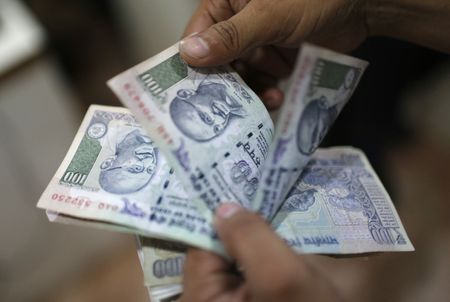By Jaspreet Kalra
MUMBAI (Reuters) – The Indian rupee shed much of its early gains to close largely unchanged on Tuesday as the U.S. dollar recovered after President Donald Trump said he was thinking about imposing tariffs on Canada and Mexico.
The rupee closed at 86.5775 against the U.S. dollar, down from its close of 86.5675 in the previous session.
While the local unit touched a peak of 86.2825 early in the session, it trimmed the gains on the back of broad-based dollar bids and a 0.5% rise in the dollar index after it touched a two-week low on Tuesday.
State-run banks were spotted intermittently offering dollars, which helped limit the pressure on the rupee, traders said.
U.S. President Donald Trump refrained from imposing tariffs on his first day in office on Monday, sending the dollar sharply lower, but later said he is considering a 25% levy on imports from Canada and Mexico, sparking a recovery in the greenback.
U.S. bond yields were lower on the day but managed to trim their decline, with the 10-year Treasury yield recovering to 4.57% after hitting a near three-week low on Tuesday.
“Markets are at least cautiously optimistic that indiscriminate universal tariffs won’t be delivered all in one go,” ING Bank said in a note.
“Expect a lot of ‘headline trading’ and short-term noise, with risks still skewed for a stronger dollar,” it said.
Meanwhile, dollar-rupee forward premiums dipped on Tuesday on the back of buy/sell swaps conducted by state-run banks, most likely on behalf of the Reserve Bank of India (RBI), traders said.
The RBI has frequently conducted buy/sell USD-INR swaps to manage the impact of its spot market interventions on rupee liquidity in the banking system. (This story has been corrected to say that rupee closed down, not up, from its previous close, in paragraph 2)
(Reporting by Jaspreet Kalra; Editing by Sonia Cheema)











